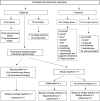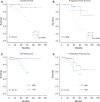Clinical characteristics, diagnosis, treatment, and prognostic factors of pulmonary mucosa-associated lymphoid tissue-derived lymphoma
- PMID: 31691549
- PMCID: PMC6912039
- DOI: 10.1002/cam4.2683
Clinical characteristics, diagnosis, treatment, and prognostic factors of pulmonary mucosa-associated lymphoid tissue-derived lymphoma
Abstract
Primary pulmonary mucosa-associated lymphoid tissue-derived (MALT) lymphoma is a rare disease with a favorable prognosis. However, its clinical characteristics, diagnosis, treatment, and prognoses remain unclear. We retrospectively analyzed 80 patients with pathologically confirmed MALT lymphoma from 2006 to 2018. The clinical characteristics, diagnosis, treatments, and prognoses of all the 80 patients were recorded. Patients were stratified into surgery and biopsy groups, respectively, to evaluate the role of surgery in the diagnosis and treatment of MALT lymphoma. The prognoses were compared between different clinical characteristics and treatments. Pathological diagnoses were confirmed by surgery, bronchoscopy, and percutaneous biopsy. Thirty patients were treated by surgery. While MALT lymphoma was only diagnosed by bronchofiberoscopy or bercutaneous biopsy in four of 18 patients in the surgery group who underwent the procedure. Six patients received adjuvant chemotherapy and one patient received involved-field radiotherapy in surgery group. Thirty-one patients were treated with chemotherapy alone, one patient was treated with radiotherapy, one patient received only symptomatic and supportive treatment, and waiting and watching without treatment were recommended in 17 patients in biopsy group. Eight patients died during follow-up and the 5-year survival rate was 87.1%. Tumor number, treatment, and age were prognostic factors for overall survival (OS), but age was the only independent prognostic factor according to multivariate analysis. While, tumor number was the only prognostic factor in the analysis about progression-free survival (PFS). No significant difference was found in OS or PFS between patients treated with and without surgical resection. MALT lymphoma is an indolent disease with favorable treatment outcome. Tumor number is associated with PFS and age is the only significant prognostic factor for pulmonary MALT lymphoma patients because of its indolent nature, but surgery still plays an important role in the diagnosis and treatment of MALT lymphoma.
Keywords: MALT lymphoma; chemotherapy; prognosis; pulmonary lymphoma; thoracic surgery.
© 2019 The Authors. Cancer Medicine published by John Wiley & Sons Ltd.
Conflict of interest statement
There are no conflicts of interest to declare.
Figures





References
-
- Cardenas‐Garcia J, Talwar A, Shah R, Fein A. Update in primary pulmonary lymphomas. Curr Opin Pulm Med. 2015;21(4):333‐337. - PubMed
-
- Ferraro P, Trastek VF, Adlakha H, et al. Primary non‐Hodgkin's lymphoma of the lung. Ann Thorac Surg. 2000;69(4):993‐997. - PubMed
-
- Habicht JM, Lori A, Stulz P, et al. Primary non‐Hodgkin's lymphoma of the lung. Will videothoracoscopic biopsy change decision‐making with regard to resection of this disease? Thorac Cardiovasc Surg. 1994;42(2):112‐115. - PubMed
-
- McCulloch GL, Sinnatamby R, Stewart S, Goddard M, Flower CD. High‐resolution computed tomographic appearance of MALToma of the lung. Eur Radiol. 1998;8(9):1669‐1673. - PubMed
-
- Parsonnet J, Hansen S, Rodriguez L, et al. Helicobacter pylori infection and gastric lymphoma. N Engl J Med. 1994;330(18):1267‐1271. - PubMed
Publication types
MeSH terms
Substances
Grants and funding
LinkOut - more resources
Full Text Sources
Medical

